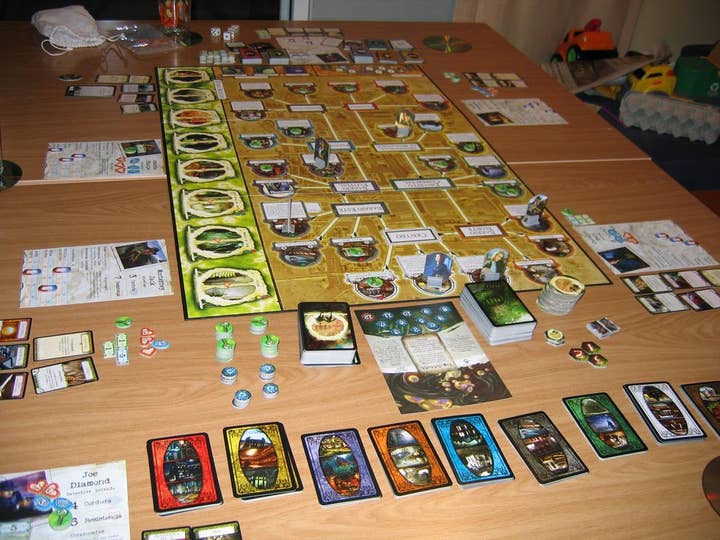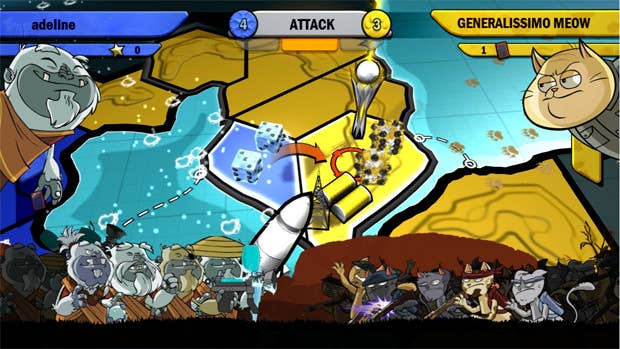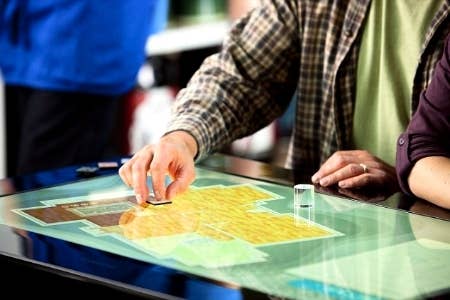The Die is Cast: How Digital is Aiding a Cardboard Comeback
Insight from those on the front lines of the board gaming revolution
Board games, according to the best historical evidence currently available, are getting on a bit. As early as 3500 BC, a simple board game known as Senet was being played in ancient Egypt, helping to establish the mixture of luck and skill which still forms the basis of so many modern equivalents. From Senet, and through five and a half thousand years of history and cultural influence, has evolved the industry which keeps many of us clothed and fed today.
And yet these upstarts, these video games, mostly devoid of pieces, boards or dice, have, as so many upstarts do, appear to have almost completely usurped their heritage. We might have played Battle Chess as kids, or Words With Friends on our lunchbreaks, but how many people do you know who regularly sit down around a table to a game of something tangible?
"We're trying to strip away all of those excuses and those reasons that people don't get into the board gaming hobby. We're trying to appeal to everyone who loves games"
John Meidersee, Campfire Creations
More than most I'd imagine, given the audience, but in my experience at least, board games are considered the geeky cousin of video games - even amongst the enthusiasts considered as geeky themselves. In the occasional and haphazard circle of friends which I play with, we all struggle to find new blood, to persuade and cajole others into sitting around a table to delve into the mystical cardboard arts.
Granted, the commitment and comprehension required of something like Fantasy Flight's Arkham Horror is not for the faint-hearted, but the advent of mainstream video games, and the Wii especially, seemed to have almost put to rest even the Christmas traditions of angry Monopoly and dynasty-cleaving Risk.
But board games are staging a comeback, both on the tabletop and the screen.
It's been a slow encroachment, this return of the elders. There have been digital versions of board games almost as long as there have been digital versions of anything, and without Dungeons and Dragons we'd likely never have seen the RPG genre at all, but the recent success of games like Ticket to Ride, Catan and Scrabble have seen dice, cards and pieces all making a welcome comeback in digital form. So what's been firing that return to the spotlight?
"There's a huge benefit to board games companies," says developer, consultant and board gamer Will Luton. "With manufacturing costs and the retail chain they might be squeezed to the point where their profit per unit is the same as selling the game on mobile and each mobile sale profits physical sells, and vice versa, without one cannibalising the other.
"If you like playing the Ticket to Ride board game with friends, for a couple of quid you can have it in your pocket to play on your own whenever you want. But it doesn't beat getting the box out and playing with friends. On the flip side of that you may pick up the mobile game, play it, grasp the rules (a big hurdle for board games) and so go out and grab the board game."
For John Meidersee of Campfire Creations - which is bringing eurogame classic Stone Age to iOS - it's touchscreen technology which has fuelled the revival, allowing an intuitive interface to bring people closer to the experience.

"Touchscreens really changed the game," he tells me. "People have been playing board games on digital devices pretty much since they existed. Before that they were playing them by mail, there's a strong tradition of that. But touchscreens, like board games, are also tactile. The ability to touch the screen and have it respond to you just makes so much sense.
"People have been talking about it since touch screens came out. That's what we're really excited about: not just sticking with phones or tablets but really growing with this market. As those large tables like the original Microsoft surface become more available and commercially viable, that's very exciting."
Keith Hurley, of Arkham Horror and Elder Sign producer Fantasy Flight Games, sees it differently again, with the spread of board games to digital as the natural result of a deepening market.
"I think the mobile game market is simply maturing to meet the growing demands of mobile gamers," Hurley told GamesIndustry International.
"The market has been super-saturated for the last couple of years with a lot of simple, arcade-style games that are great in small doses, but grow stale quickly. So I think we're starting to see a growing demand for more depth and complexity with mobile games. I think digital board games are starting to fill that need and people are hungry for more of those quality, in-depth experiences.
"Physical tabletop games are getting more exposure each year as well. You see board games cropping up more often in popular culture all the time, and I feel that audiences are gaining a far better understanding that there's a whole world of games beyond the traditional family game staples out there."
Hurley's got a point. Whilst many of the first games to take advantage of the touchscreen revolution offered by smartphones and tablets were fairly traditional, easy to learn games like Trivial Pursuit, increasingly we're seeing more complex games coming to the medium. With these games, learning how to play is a big part of the process, but when a vocal community of board gamers has already exhaustedly tested, balanced and examined your ruleset with a fine-tooth comb, isn't the conversion process just a matter of adding the graphics and bit of AI?
"You could do a good board game from any video game, if you find a good game mechanic that makes it fun"
Aarnd Beenen, Settlers of Catan
Camilo Soto, lead designer at Campfire Creations, points out that there's a bit more to it than that.
"There are a number of different challenges to creating an electronic version of a board game," Soto explains.
"The technical side of it isn't that much different to creating any videogame, the style factor is a little simplified by the fact that it is a board game. A lot of the balancing and all of the game design decisions have already been made and the rules have been proven to work already.
"So it becomes a challenge of converting it to a good digital experience, but that's not an easy feat, it's not just a translation project. The bigger challenge, and what we mostly take pride in, is that we go to the core concepts and mechanics that make the board game good and transfer those to the digital era.
"Board games are supposed to be easy to pick up, you should start having fun right away. The good games are the games that give you a deeper level of complexity and reward the more you play them, without necessarily getting more complex themselves. Stone Age is going to be the same game every time you play it: you don't get new weapons or level up, the game doesn't change, it's you that changes. The player gets better and gets a deeper experience because of that."

So, with a wealth of pre-tested, balanced and established IP waiting to be converted from the physical to digital, we can expect the process to gather pace. However, if they're making their product cheaper, more portable and more readily available, aren't developers running the risk of cannibalising the board game audience itself?
"There is something inherently magical about getting a physical box filled with nicely crafted pieces that make up a game," Luton tells me. "They are very often lovely things to own. As nicely as a video game may be presented, they won't ever match that. The revival of board games is the same that is happening with the revival of vinyl in music - a nostalgia for the physical in world of throw-away digital.
"Secondly, one doesn't kill the other. I was at a Magic: The Gathering tournament at a comic shop and played the store manager. Asked where all the popularity had come from and he said, very quickly: 'The PlayStation game'. Most people come in asking for packs after playing the video game. The room was filled and turn out had doubled in six months."
That 'feedback loop' is something which several other developers back up. Ticket to Ride, produced by Days of Wonder, has seen a spike in physical sales since releasing the successful iOS version of the railway management game. Once people buy into the concept, they want variations on that theme - not too differently from the split between console and mobile gaming.
"I don't think that board games will be ever replaced by video games in general," agrees Aarnd Beenen, part of the team which curates the digital version of board game classic Catan. "Board Games have a big distinction against video games and that is the haptic factor. Board game players will always want this feeling of playing with real playing pieces. But what will be available more and more are a fusion of board games and video games, where you use elements from both worlds for new gaming experiences.
"The game that taught me more about design than anything else has been Dungeons & Dragons."
Will Luton
"We know that we can never reach that level of social interactivity that a game with real players sitting around a table has, so we see the electronic versions as a way to enjoy the game even if you do not have players around. A good AI or network game can make fun, too, but in the end a game at a table with your friends or family is always the better deal."
For Keith Hurley, each medium has its advantages and should be biased towards those, rather than directly emulating each other. Digital games might lack the face-to-face engagement offered by sitting down around a kitchen table, but they do offer a totally different form of sensory immersion.
"Both platforms have their strengths," says the Fantasy Flight designer. "There is a human element to tabletop gaming that I don't think will ever be replaced in an electronic format. Games that are rich with diplomacy, intrigue, and bluffing are incredibly difficult to reproduce in a digital medium for example.
"However, our philosophy with digital games has always been that if we can abstract decks of cards, timing tracks, or generally make the game less like a board on a table, we should. Why treat a card like a card when we can make it a 3D character, a full-screen art piece, or some other dynamic representation? This is where digital shines."

